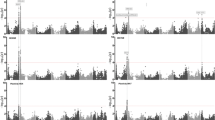Abstract
There is public concern about the consequences of pollen dispersal from genetically modified (GM) crops. There lease of viable pollen from GM maize can be controlled by growing mixtures of cytoplasmic male-sterile plants and male-fertile non-transformed pollinator plants. Our experiments indicate that such associations can bring about grain yields as high or even higher than those produced by pure male-fertile maize crops, especially when the male-sterile component is pollinated non-isogenically. The grain yield benefits from cytoplasmic malesterility and xenia as well as the fact that seed of male-sterile varieties can be produced cheaply and reliably in large quantities would facilitate the implementation of the proposed system in agricultural practice.
Similar content being viewed by others
References
Bulant, C. & A. Gallais, 1998. Xenia effects in maize with normal endosperm. I. Importance and stability. Crop Sci 38: 1517-1525.
Feil, B. & J.E. Schmid, 2002. Dispersal of Maize, Wheat and Rye Pollen. A contribution to determining the necessary isolation distances for the cultivation of transgenic crops. Shaker Verlag, Aachen.
Kaeser, O., U. Weingartner, K.-H. Camp, S. Chowchong & P. Stamp, 2003. Impact of different cms types on grain yield of dent × flint hybrids of maize (Zea mays L.). Maydica (in press).
Levings, C.S.I., 1990. The Texas cytoplasm of maize: cytoplasmic male sterility and disease susceptibility. Science 250: 942-947.
Liu, Z., S.O. Peter, M. Long, U. Weingartner, P. Stamp & O. Kaeser, 2002. A PCR assay for rapid discrimination of sterile cytoplasm types in maize. Crop Sci 42: 566-569.
Losey, J.E., L.S. Raynor & P.C. Lyons, 1999. Transgenic pollen harms monarch larvae. Nature 399: 214.
Mikkelsen, T.R., B. Andersen & R. Bagger Jørgensen, 1996. The risk of transgene spread. Nature 380: 31.
Quist, D. & I.H. Chapela, 2001. Transgenic DNA introgressed into traditional maize landraces in Oaxaca, Mexico. Nature 414: 541-543.
Rogers, J.S. & J.R. Edwardson, 1952. The utilization of cytomplasmic male-sterile inbreds in the production of corn hybrids. Agron J 44: 8-13.
Stamp, P. & B. Feil, 2001. Seed Composition and Method for Reducing and Preventing the Release of GMO (Genetically Modified Organism) Pollen from Crop Stands. International Patent filed PCT/CH01/0040.
Stamp, P., S. Chowchong, M. Menzi, U. Weingartner & O. Kaeser, 2000. Increase in the yield of cytoplasmic male-sterile maize revisited. Crop Sci 40: 1586-1587.
Strachan, S.D. & S.L. Kaplan, 2001. Responses of high-oil and hybrid corn to rootworm beetles during pollination. Agron J 93: 1043-1048.
Thomison, P.R. & A.B. Geyer, 1999. Evaluation of TC Blends (©) used in high oil maize production. Plant Var Seeds 12: 99-111.
Thomison, P.R., A.B. Geyer & B.L. Bishop, 2001. Field drying of TopCross High-Oil Corn grain. Agron J 93: 797-801.
Tsai, C.L. & C.Y. Tsai, 1990. Endosperm modified by cross-pollinating maize to induce changes in dry matter and nitrogen accumulation. Crop Sci 30: 804-808.
Weiland, R.T., 1992. Cross-pollination effects on maize (Zea mays L.) hybrid yields. Can J Plant Sci 72: 27-33.
Author information
Authors and Affiliations
Rights and permissions
About this article
Cite this article
Feil, B., Weingartner, U. & Stamp, P. Controlling the release of pollen from genetically modified maize and increasing its grain yield by growing mixtures of male-sterile and male-fertile plants. Euphytica 130, 163–165 (2003). https://doi.org/10.1023/A:1022843504598
Issue Date:
DOI: https://doi.org/10.1023/A:1022843504598



